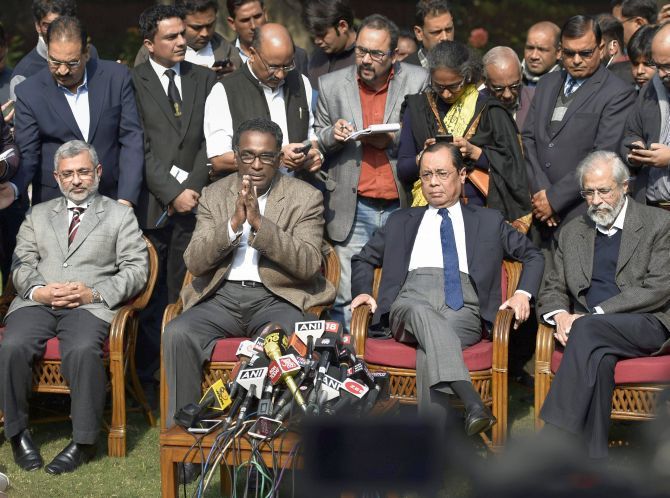By raising a banner of revolt against the CJI, the 4 judges have dealt a body blow to the faith of many Indians in the Supreme Court, argues Sudhir Bisht.

IMAGE: Supreme Court Justice Jasti Chelameswar, second from left, with Justice Kurien Joseph, to his right, and Justices Ranjan Gogoi and Madan B Lokur to his left at their press conference in New Delhi, January 12, 2018. Photograph: Ravi Choudhary/PTI Photo
I dashed to my room to switch on the TV after Rediff.com alerted me that the four senior-most judges of the Supreme Court -- No 2, 3, 4 and 5 in the pecking order after the Chief Justice of India -- were holding a press conference against the CJI's arbitrary way of functioning.
Two clips were being shown repeatedly on various television channels. One was of Shekhar Gupta, the eminent journalist, being signalled by Justice Jasti Chelameswar to come forward and join the group of journalists. Gupta signalled as if to say, 'It is ok, I am fine here.'
The second clip that was repeatedly shown was of Communist Party of India leader D Raja exiting Justice Chelameswar's home later.
These two images registered in my mind immediately and I must add here that they could be completely wrong. But in the world of 24x7 media, impressions carry far more weight over reality. My questions arising from them are:
1. Did the four judges seek the help of someone like Shekhar Gupta before executing their plan?
2. Was there political backing before going public on January 12, 2018?
For me, the press conference had a somewhat intriguing beginning and an undesirable postscript.
I would like to focus on the real issue raised by the judges which revolves mainly around the formation of benches by the CJI.
It is an established practice that the CJI is the sole and final master of the roster and is the only one entitled to form a bench.
In the recent past Justice Chelameswar had tried to assign this right to himself, but this was swiftly neutralised by a five-judge Constitution Bench.
The primary allegation by Justice Chelameswar and his fellow judges is that the present Chief Justice was assigning cases to benches as per his will.
This argument seems to have no merit as the eminent lawyer and former Union minister Salman Khurshid has said that the roster and bench assignment was 'largely' taken care of by a computer system.
But the four judges alleged that the formation of benches was not proper. Having leveled such a serious allegation against the CJI, it was the moral duty of the four judges to have proved their charge by giving detailed examples.
In fact, I don't understand the logic of going to the press. I feel it was very enigmatic and strange.
I had thought the Supreme Court was an assembly of 25 wise men who were the ultimate resolvers of all the conflicts plaguing our country. Now the citizens of the country have realised that the august body is itself a divided house.
How can a group of people who are at conflict with one another provide justice to others?
What did the four judges think they would achieve by going public?
Did they think impeachment proceedings would commence, forcing the CJI to resign?
Why could the four judges not have written a letter to the President of India seeking his mediation in the matter?
I know the Judiciary is independent of the Executive, but it is better to approach the Head of State and seek his help rather than wash dirty linen at a presser.
At the press conference Justice Chelameswar on one hand said the Chief Justice of India was only the 'first among equals', and on the other hand said the CJI sometimes forms a bench which doesn't take care of the seniority of judges. Isn't this an oxymoron of sorts?
On one hand you tell the CJI, 'Mr CJI, You may be the chief, but that's only a title, otherwise you and we are equals!'
And on the other you seem to be complaining, 'Look, Mr CJI, that case is an important case and it has far-reaching consequences. So you can't assign it to a bench with members who are No 10, No 13, No 16 and No 19 in seniority.'
We all know that Supreme Court judges have served as high court judges for at least five years before being elevated to the Supreme Court. Many of them have been chief justices of high courts too.
Then how is it that matters of 'far-reaching consequences' can't be allotted to judges who are not part of the Collegium system (that comprises the five senior-most Supreme Court judges)?
Justice Chelameswar and his three brother judges, in raising a banner of revolt against the CJI, have dealt a body blow to the faith of many Indians in the institution of the Supreme Court, by hinting that some benches are less qualified than other benches of the same court.
Is this what the four judges wanted to convey?
I hope the four judges will answer the questions haunting the minds of people like me.
I am glad that no political party has tried to make a killing from this press conference. Salman Khurshid's reflective mood gives me hope that politicians will let the 25 judges of the Supreme Court sort it among themselves.
Sudhir Bisht, PhD, Delhi-based author and columnist, tweets at @sudhir_bisht










